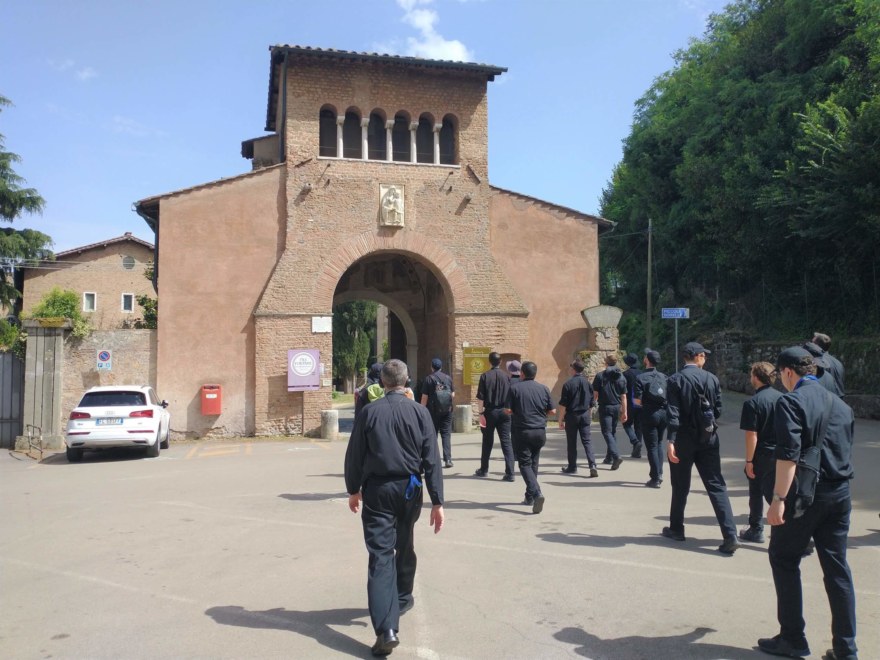Pilgrim Church on Earth | Reflections from Rome 2022
According to Fr. Pietro Giacomo Bacci, one of St. Philip Neri’s most prominent biographers, Philip established the Seven Church Walk in Rome to divert the members of his flock from spiritual dangers. This wise pastor singled out public events in Rome that offer temptations, such as the Carnival, as ideal times to take the young people of the city on a long walk from church to church and pray. Like its founder, this exercise gained popularity throughout the city Rome and beyond. In fact, my first experience of the Seven Church devotion was on the day before Palm Sunday in Washington, D.C. in 2019. Pilgrimage was certainly not a new idea in the Church of Philip’s time, but he recognized that it needed to be renewed for the generation after him, and I am personally grateful to him for coming up with a pilgrimage that can be completed within one’s own city and not necessarily at distant shrines in foreign lands.
Having visited numerous historic churches in the past few weeks, including a Seven Church Walk, I am starting to detect various attitudes about pilgrimage that arise within me. Sometimes I feel great about walking and praying, while other times it seems difficult and pointless. It is even possible to catch glimpses of the attitudes of fellow pilgrims based on their behavior. Some go on pilgrimage for the express purpose of praying and therefore are not inclined to talk much with others in the group. Others might enjoy getting to know the people along the way but prefer to keep silent upon reaching the next church. One group of people might be talking about ordinary things while others only want to talk about Jesus. I am sure there are many who walk among the churches of Rome mainly to behold the beautiful feats of architecture and analyze the priceless works of art within. I can even imagine pilgrims who are not particularly excited about pilgrimage at all, which is almost certainly a challenge St. Philip Neri would have had to confront if he was trying to help youths who normally get into trouble.
If life — and particularly our life in Christ — is a journey, we might say that a pilgrimage is a miniature image of that life. At some Masses we even hear the priest asking God to bless His “pilgrim Church on earth.” Pilgrims must exert themselves to move toward the church where Christ dwells sacramentally, and this mirrors our progression toward Heaven, where we will finally be able to rest in the Love of God. In pilgrimage, as in life, we meet people who are enthusiastic about walking toward God and others who are less so, yet we are called to love and walk with them. Neither pilgrimage nor life in God excludes with engagement with worldly things along the way, but our fundamental orientation must be towards Heaven.
In both cases, our basic attitudes matter. Why am I walking? Which road will I take? With whom will I walk? Will I keep going? Our answers to these questions make a world of difference in our experience of a church walk and in our experience of life. If I get discouraged by detours or do not wish to be walking in the first place, I might give up the journey. If I keep the end goal in mind, on the other hand, it becomes possible for me to receive the strength to keep going, which must be based on the grace of God and the encouragement of my fellow pilgrims.
Perhaps the most encouraging aspect of the pilgrimage as an analogy for life is both cases allow time for us to change our attitude toward the journey. The pilgrimage itself provides an opportunity to anyone who begins it with a bad attitude to change along the way. I myself started the long road to Saint Paul Outside the Walls with a temptation to quit, but the experience of that stunning basilica inspired me with the power and goodness of God, giving me the encouragement I needed to keep going.
Lord, we pray through the intercession of St. Philip Neri for Your pilgrim Church on earth; may we receive the love and strength we need to complete the journey and rest forever in You.
Stephen Kirby
Archdiocese of Baltimore


